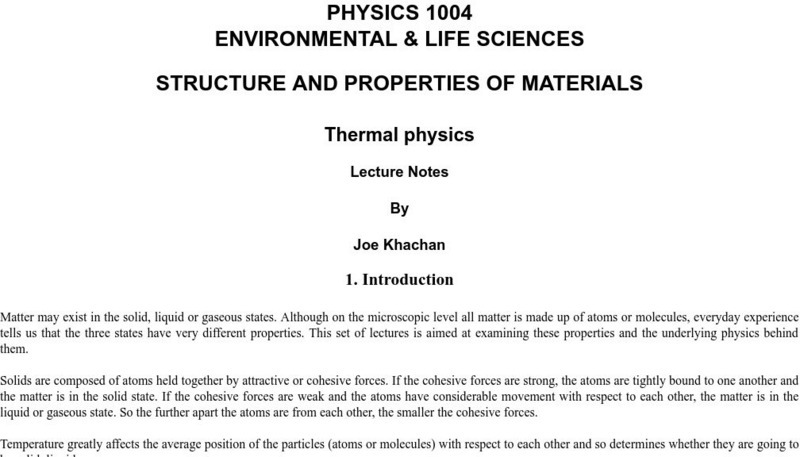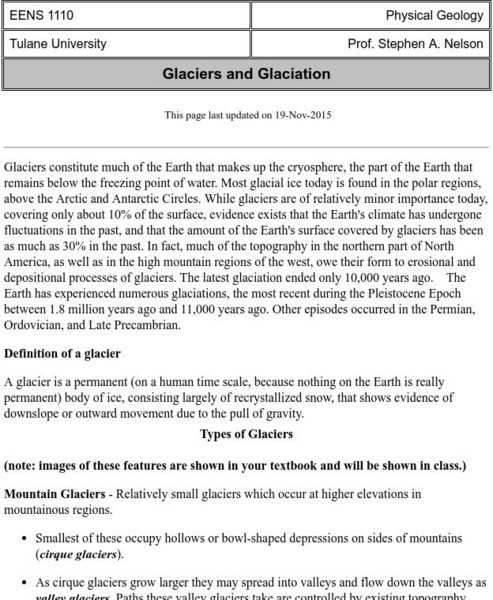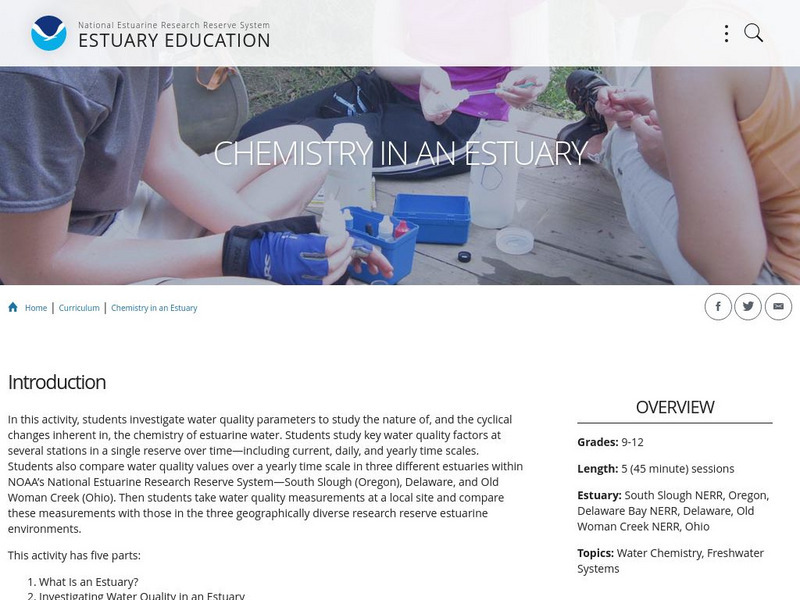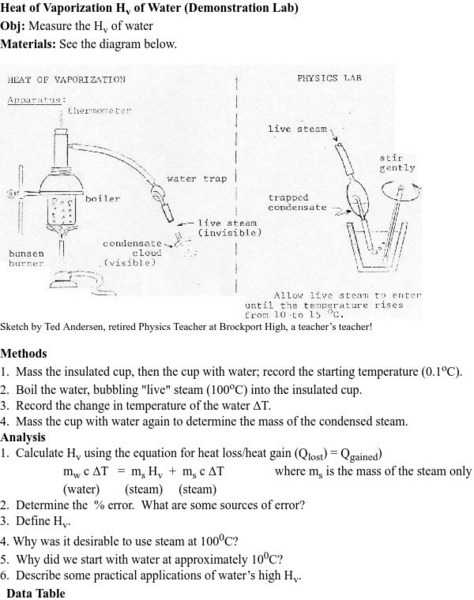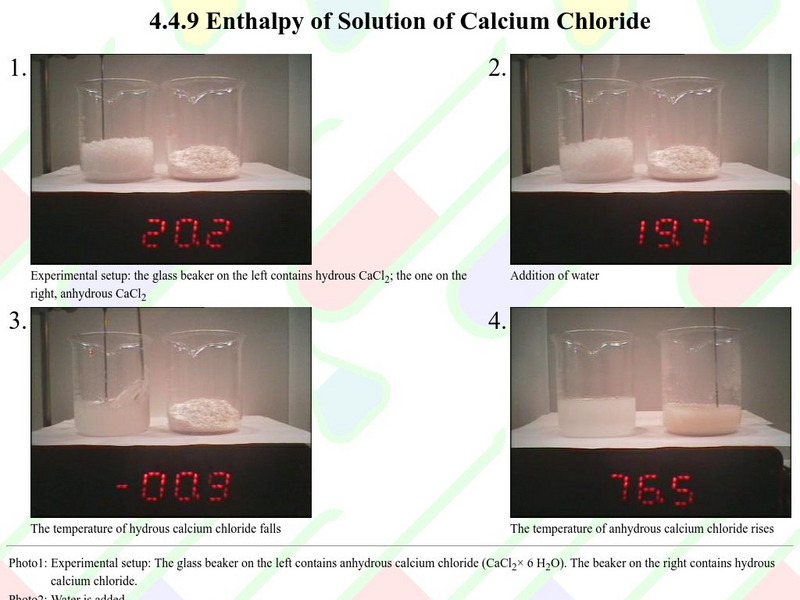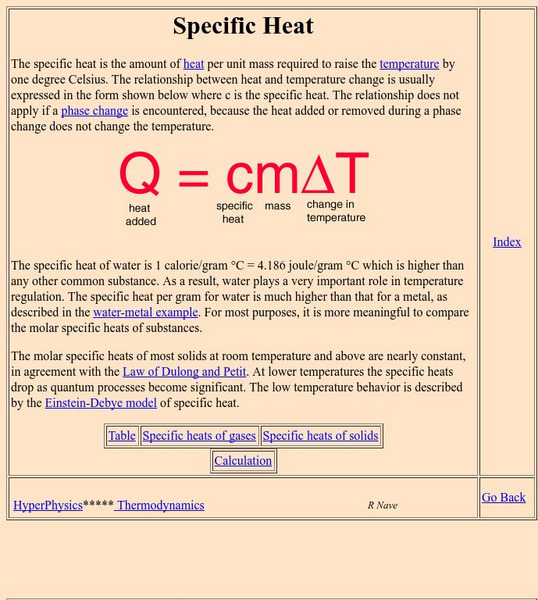American Chemical Society
Middle School Chemistry: Changing State: Freezing
Learners investigate how low temperature causes water vapor to condense into a liquid and then freeze to form a solid.
University Corporation for Atmospheric Research
Ucar: Just a Phase: Water as a Solid, Liquid, and Gas
This site helps students construct a model of the arrangement of water molecules when present as solid, liquid or gas. Includes background information, lesson plans, links to standards and assessment ideas.
American Chemical Society
Middle School Chemistry: P H and Color Change
Learn about color change and pH as it relates to chemical changes.
University of Sydney (Australia)
University of Sydney: Structure and Properties of Materials/thermal Physics
An exhaustive set of "lecture notes" on various topics in thermal physics (including thermal expansion). Explanations are well done and more interesting than most. Includes both a mathematical and conceptual treatment of topics. Humor,...
Center of Science and Industry
Cosi Columbus: A Swell Activity With Beans [Pdf]
Learn about absorption in this hands-on science experiment. Includes full list of materials, procedures, and scientific explanation of what happens to different types of beans as they soak in water in a test vial.
Other
Tulane University: Physical Geology: Glaciers and Glaciation
Lots of information here about glaciation, types of glaciers, the formation of glacial ice, changes in glacier size, how glaciers move, glacial erosion, landforms produced by glaciers, glacial deposition and drift, effects of glaciation...
New York University
New York University: States of Water
Use this resource to learn about the three different phases of water; solid, liquid, and gas. What happens to water as it changes into a solid or gas? Includes short and easy to do activity.
Physics Aviary
Physics Aviary: Guided Specific Heat Lab
This lab is designed to have students learn how to calculate the specific heat of a liquid based on the temperature changes that occur when hot water is added to the liquid.
Physics Aviary
Physics Aviary: Guided Specific Heat of Solid Lab
This lab is designed to have students learn how to calculate the specific heat of a solid based on the temperature changes that occur when a hot solid is added to cold water.
CK-12 Foundation
Ck 12: Physics Simulation: Electric Ice Sheet
Balance electric charges to prevent Tommy from slipping into icy water. You are presented with 4 particles, each with a charge value. Using the plus/minus scrollbar, you can change the value of the highlighted charge. Then press the play...
CK-12 Foundation
Ck 12: Physical Science: Oceanic Pressure
[Free Registration/Login may be required to access all resource tools.] Oceanic pressure and how it changes with depth, and how to adjust to this change.
American Association of Physics Teachers
Com Padre Digital Library: Open Source Physics: Atwood Machine in Fluid Model
Simulation of an Atwood machine where two masses of varying densities are suspended in water using a pulley system. Adjust the densities of the masses, their positions and the water level to see how the changing gravitational, buoyant,...
Physics Central
Physics Central: Physics in Your Glass: Racing Molecules
An easy experiment for demonstrating and exploring molecule movement requiring common household items: two glasses, two dark colors of food coloring, and warm and cold water. A few variations to the experiment will have students using...
NOAA
Noaa: More Than Salt in Salt Water [Pdf]
Realize that there is more in ocean water than just salt. Find out about the salinity of water and how changes in salinity may affect organisms living in the water.
American Museum of Natural History
American Museum of Natural History: Grow Rock Candy
Students can carry out an investigation using sugar and water to determine whether heating or cooling a substance may cause changes that can be observed. This activity reinforces the ideas that the properties of materials can change when...
NOAA
Noaa: Estuaries 101 Curriculum: Chemistry in an Estuary
This activity introduces students to the complex chemistry of estuarine water. Students investigate how chemical and physical water quality factors-pH, temperature, dissolved oxygen, and salinity-change and interact over varying time...
CK-12 Foundation
Ck 12: Physical Science: Boiling
A module reviewing over how vaporization occurs and its difference from evaporation. Also, review over the definition of boiling point. Module includes a video, pictures, explanation, and review questions.
University of Maryland
University of Maryland: Boiling Water by Pumping
A page from the University of Maryland Physics Lecture Demonstration Facility. Provides directions for a teacher demonstration which utilizes a Bell jar and vacuum pump to show the dependency of boiling point upon pressure. Shows...
University of Maryland
U. Of Maryland: Latent Heat: Ice to Water to Steam
A page from the University of Maryland Physics Lecture Demonstration Facility. Provides directions for a teacher demonstration of latent heat in the melting and vaporization process. Shows apparatus and set-up; provides suggestions....
Cosmo Learning
Cosmo Learning: The Atmosphere, the Ocean, and Environmental Change
A collection of video lectures from a course that explores the physical processes the control Earth's atmosphere, ocean, and climate that is taught at Yale University. The course covers topics like clouds, rain, severe storms, regional...
Museum of Science
The Atom's Family: Phases of Matter
Help the Phantom choose a material and observe the changes at different temperatures in the molecule chamber. What happens to the elements or molecules as the temperature changes?
Other
Physics Labs/heat of Vaporization (Hv) of Water
A complete set of directions, notes and suggestions for a demonstration involving the determination of the heat of vaporization of water. Suitable for a student project or lab investigation.
Other
University of Siegen: Enthalpy of Solution
This resource provides a physical reaction. Hydrous and anhydrous calcium chloride react with water to produce physical exothermic and endothermic reactions.
Georgia State University
Georgia State University: Hyper Physics: Specific Heat
This page from Georgia State University provides information on specific heat. Formulas are included. You can also enter in information into the site and have it calculate it for you.




